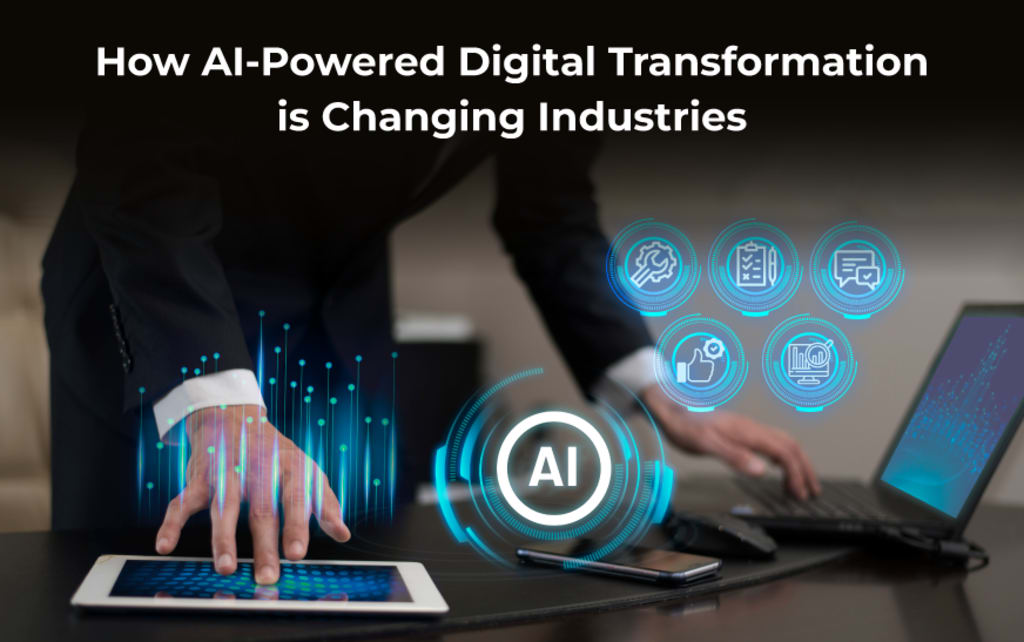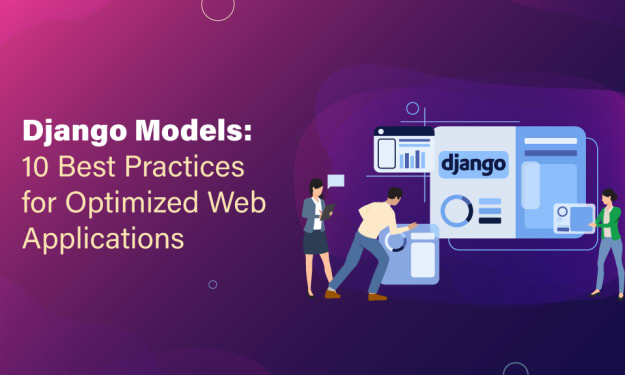How AI-Powered Digital Transformation is Changing Industries
AI-powered digital transformation is positively impacting and reshaping various industries. Learn about its implementation, challenges, execution, and more.

In today's rapidly evolving world, AI-powered digital transformation is revolutionizing industries across the globe. From healthcare to finance and retail to manufacturing, AI technologies are streamlining operations, enhancing customer experiences, and driving innovation. This transformation is not just about adopting new tools but reimagining entire business models to stay competitive and meet the demands of the digital age.
Imagine a hospital where AI algorithms analyze patient data in real-time, enabling doctors to make quicker and more accurate diagnoses. Or consider a retail store using AI to personalize shopping experiences, predict customer preferences, and optimize inventory management. These are just a few examples of how AI reshapes traditional industries, making them more efficient, responsive, and future-ready. If you are also planning to integrate AI-powered digital transformation into your business, opt for AI/ML development services. But before that, read this blog to understand the impact of AI-powered digital transformation in various industries.
Understanding AI-Powered Digital Transformation
In today's rapidly evolving world, AI-powered digital transformation is revolutionizing industries across the globe. Here's how:
- Streamlining Operations: AI technologies automate routine tasks, reduce errors, and increase efficiency. This leads to cost savings and allows employees to focus on more strategic activities.
- Enhancing Customer Experiences: Personalized recommendations, responsive customer service, and tailored marketing strategies improve customer satisfaction and loyalty. AI helps businesses understand customer behavior and preferences more deeply.
- Driving Innovation: AI enables the development of new products, services, and business models that were previously unimaginable. Companies can now explore new markets and opportunities with AI-driven insights.
- Optimizing Supply Chains: AI improves supply chain management by predicting demand, optimizing inventory levels, and identifying potential disruptions before they occur. This ensures smoother operations and better resource allocation.
- Improving Decision-Making: AI provides data-driven insights and predictive analytics, helping businesses make more informed and timely decisions. This enhances overall strategic planning and risk management.
- Enhancing Security: AI-powered security systems can detect and respond to threats faster and more accurately than traditional methods. This helps protect sensitive data and maintain the integrity of business operations.
- Facilitating Remote Work: AI tools enable seamless remote collaboration and communication, ensuring productivity and connectivity regardless of physical location.
The Impact of AI on Various Industries
AI is impacting various industries by changing how they operate and innovate. Let's see how AI is making a big difference in different sectors.
AI in Healthcare
Beyond its application in research activities to understand, reshape, and discover diseases, AI has practical, real-world applications. For instance, AI can interpret MRI scans or X-rays to spot signs of cancer, reducing the likelihood of misdiagnosis. Various AI applications improve operational efficiency and lead to cost savings and better patient experiences, making healthcare systems more effective and responsive.
- Medical Imaging and Diagnostics: AI analyzes medical images to detect diseases like cancer accurately.
- Predictive Analytics: AI predicts disease outbreaks, patient readmissions, and treatment outcomes, allowing for proactive care.
- Personalized Medicine: AI tailors treatments to individual patients based on their genetics and lifestyle.
- Robotic Surgery: AI-powered robots assist in surgeries, increasing precision and reducing recovery times.
- Administrative Tasks: AI automates tasks like scheduling and billing, freeing up healthcare providers to focus on patients.
- Drug Discovery: AI speeds up drug discovery by predicting potential drug candidates.
- Virtual Health Assistants: AI-driven virtual assistants provide round-the-clock patient support, answering questions and monitoring health conditions remotely.
AI in Finance
From shifting through large datasets to analyze unusual activities to flagging suspicious transactions in real-time, AI is enhancing safety and reducing fraudulent activity. It makes financial mechanisms more secure. Further, it transforms customer satisfaction and opens the way for personalized banking. Thus, AI is helping customers make informed financial decisions.
- Fraud Detection: AI analyzes transactions in real-time to detect and prevent fraudulent activities.
- Risk Management: AI assesses risks more accurately by analyzing vast amounts of data, helping financial institutions make better decisions.
- Customer Service: AI-powered chatbots and virtual assistants provide instant customer support, answering queries and resolving issues.
- Algorithmic Trading: AI algorithms analyze market data to make high-frequency trading decisions, maximizing profits.
- Credit Scoring: AI evaluates creditworthiness by analyzing alternative data sources, providing fairer access to credit.
- Personalized Financial Advice: AI offers customized investment advice and financial planning based on individual preferences and goals.
- Automating Compliance: AI helps ensure regulation compliance by monitoring transactions and flagging suspicious activities.
AI in Retail
The most prominent impact of AI is in the retail industry. From personalized shopping experiences and data-driven marketing strategies to inventory management, AI has been the driving force reshaping e-commerce and retail. Thus, AI enables businesses to achieve greater efficiency, reduce operational costs, enhance supply chain responsiveness, and improve profitability and customer satisfaction.
- Personalized Shopping: AI analyzes customer behavior to offer personalized product recommendations, enhancing the shopping experience.
- Inventory Management: AI predicts demand and optimizes inventory levels, reducing stockouts and overstock situations.
- Customer Service: AI-powered chatbots and virtual assistants provide instant support, answering queries and assisting with purchases.
- Dynamic Pricing: AI adjusts prices in real-time based on demand, competition, and other factors to maximize sales and profits.
- Visual Search: AI allows customers to search for products using images, making it easier to find exactly what they want.
- Supply Chain Optimization: AI improves supply chain efficiency by predicting disruptions and optimizing logistics.
- Fraud Prevention: AI detects fraudulent activities in real-time, protecting retailers and customers from fraud.
AI in Manufacturing
AI-driven automation increases production efficiency, lowers operational costs, and improves product quality. From helping the production lines run smoothly and monitoring product quality to continuously innovating, AI is impacting all vertices. By integrating AI, manufacturers can stay competitive and respond quickly to changing market conditions.
- Predictive Maintenance: AI predicts equipment failures before they occur, reducing downtime and maintenance costs.
- Quality Control: AI-powered systems inspect products for defects with high precision, ensuring consistent quality.
- Supply Chain Optimization: AI optimizes supply chain management by predicting demand, optimizing inventory, and improving logistics.
- Production Planning: AI helps with efficient production scheduling, reducing lead times, and improving resource utilization.
- Robotics and Automation: AI-driven robots perform repetitive tasks with high accuracy, increasing efficiency and safety.
- Energy Management: AI optimizes energy usage in manufacturing processes, reducing costs and environmental impact.
- Product Design and Innovation: AI analyzes data to drive product design and development innovation, leading to better and more efficient products.
AI in Marketing
AI makes all marketing efforts more effective. Businesses can increase engagement, improve conversion rates, and build stronger customer relationships by delivering personalized messages and offers to specific audience segments.
- Personalized Marketing: AI analyzes customer data to deliver highly personalized content and product recommendations, enhancing customer engagement and satisfaction.
- Customer Segmentation: AI segments customers based on behavior, preferences, and demographics, allowing for more targeted and effective marketing strategies.
- Predictive Analytics: AI predicts customer behavior and trends, enabling marketers to anticipate needs and tailor campaigns accordingly.
- Content Creation: AI generates content for blogs, social media, and advertisements, saving time and ensuring consistency.
- Campaign Optimization: AI analyzes campaign performance in real-time, adjusting strategies to maximize ROI and effectiveness.
- Chatbots and Virtual Assistants: AI-powered chatbots engage with customers, answer queries, and provide support, leading to better customer service.
- Sentiment Analysis: AI monitors and analyzes customer sentiment across social media and other platforms, helping brands understand public perception and react accordingly.
Challenges and Considerations
While AI-powered digital transformation offers numerous benefits, it also presents several challenges and considerations that businesses must address:
- Data Privacy and Security: The use of AI involves collecting and analyzing large amounts of data, raising concerns about data privacy and security. Companies must comply with data protection regulations and implement robust security measures.
- Bias and Fairness: AI algorithms can inadvertently perpetuate biases in the training data, leading to unfair outcomes. It is crucial to develop and maintain unbiased AI systems to ensure fairness and equality.
- Integration with Legacy Systems: Integrating AI with legacy systems can be complex and costly. Businesses need to plan carefully to ensure seamless integration without disrupting operations.
- Skills and Expertise: Implementing AI requires specialized skills and knowledge, which may be lacking in many organizations. Investing in training and hiring skilled professionals is essential for successful AI adoption.
- Cost and ROI: The initial investment in AI technology can be significant, and businesses must carefully evaluate the potential return on investment (ROI) to justify the costs.
- Ethical Considerations: The use of AI raises ethical questions, such as the impact on employment and decision-making processes. Companies must consider these ethical implications and develop guidelines for responsible AI use.
- Continuous Monitoring and Maintenance: AI systems require ongoing monitoring and maintenance to ensure they perform effectively and adapt to changing conditions. This can be resource-intensive and requires a long-term commitment.
Addressing these challenges and considerations is critical for businesses to successfully implement AI-powered digital transformation and fully realize its potential benefits.
Conclusion
AI-powered digital transformation is changing industries by making operations more efficient, improving customer experiences, and driving innovation. While there are challenges like data privacy and integration with old systems, businesses that address these can stay competitive. Choosing AI is about more than just new technology; it’s about rethinking how businesses operate. As AI evolves, its impact will keep growing, making it crucial for companies to adapt and innovate.
About the Creator
Nicholas Winston
Working as an IT Manager in a reputed Digital Transformation and Software Solution Company in India. Being a technical writing enthusiast, I have served in the Information technology, Services, and Product industry.
Enjoyed the story? Support the Creator.
Subscribe for free to receive all their stories in your feed. You could also pledge your support or give them a one-off tip, letting them know you appreciate their work.






Comments
There are no comments for this story
Be the first to respond and start the conversation.